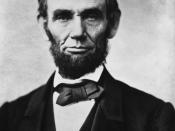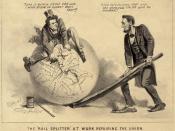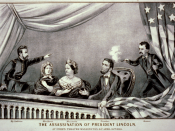Either slavery or the nation had to perish. In history classes now-a-days we are told, Abraham Lincoln rose to the presidency and took the needed steps to end the intolerable situation of segregation by making sure that the South did not withdraw from the Union and remain a slave-holding society. Does he really deserve all this credit? This used to seem a plausible story to me. Most people are quite satisfied with the ending, hoping that, in time, effects of slavery and segregation would vanish and the country would emerge supportive of individual rights for all. Yet, there were some difficulties with the story, (after being exposed to Leon Litwack and Fredrick Douglas' works). Abraham Lincoln had moral objections to the slave system, which is indicated in the Gettysburg Address, yet his duty to the union became his primary and only objective, and his actions were based solely on the mentality of the majority.
Instead of starting from slavery the conflict started from the difference in economic policies of the Northern and Southern states, some of them related to slavery but others were independent of it. Slavery, however, had been planted in both sections of the Union and had proved unprofitable in the North and profitable in the South. The South sought to expand the influence of the slavery; the North sought to contract it. For Lincoln his top priority was dealing with preserving the Union. There is no doubt that Abraham Lincoln despised segregation and desired equality. However Lincoln refused to make a bad situation, with the Union, worse by any ill-judged or ill-timed effort to make freedom for all men reign, as he spoke of in the Gettysburg Address, unless it was necessary. His fear that any public abolitionist moves might drive slave states into confederacy...


